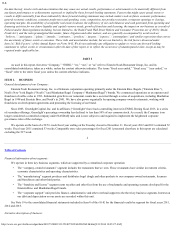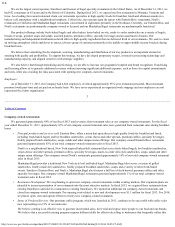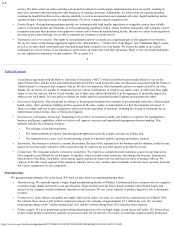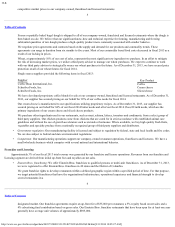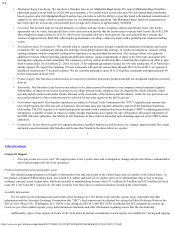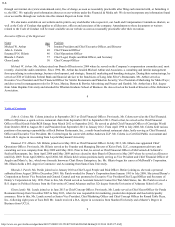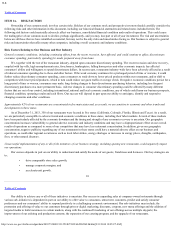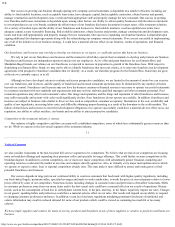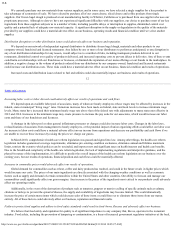Einstein Bros 2013 Annual Report Download - page 10
Download and view the complete annual report
Please find page 10 of the 2013 Einstein Bros annual report below. You can navigate through the pages in the report by either clicking on the pages listed below, or by using the keyword search tool below to find specific information within the annual report.
10-K
http://www.sec.gov/Archives/edgar/data/949373/000119312514073832/d629623d10k.htm[9/11/2014 10:05:27 AM]
Our success in growing our business through opening new company-owned restaurants is dependent on a number of factors, including our
ability to: find suitable locations, reach acceptable lease terms, have adequate capital, find acceptable contractors, obtain licenses and permits,
manage construction and development costs, recruit and train appropriate staff and properly manage the new restaurant. Our success in opening
new franchise and license restaurants is dependent upon, among other factors, our ability to: attract quality businesses with the interest and desire
to invest/purchase in our core brands, maintain the effectiveness of our franchise disclosure documents in target states, offer restaurant solutions
for a variety of location types and the ability of our franchisees and licensees to: find suitable locations, reach acceptable lease terms, have
adequate capital, secure reasonable financing, find available contractors, obtain licenses and permits, manage construction and development costs,
locate and train staff appropriately and properly manage the new restaurants. Our success in expanding our franchise business is dependent upon
signing additional development agreements along with the refranchising our company-owned restaurants. If we are not successful in implementing
any or all of the initiatives of our business strategy, it could have a material adverse effect on our business, results of operations, and financial
condition.
Our franchisees and licensees may not help us develop our business as we expect, or could take actions that harm our business.
We rely in part on our franchisees and licensees and the manner in which they operate their restaurants to develop and promote our business.
Franchisees and licensees are independent operators and are not our employees. As we offer and grant franchises for our Einstein Bros. and
Manhattan Bagel brands, our reliance on our franchisees is expected to increase in proportion to growth of the franchisee base. With respect to
franchising our Einstein Bros. brand, we may not be able to identify franchisees that meet our criteria, or to enter into franchise area development
agreements with prospective franchisee candidates that we identify. As a result, our franchise program for the Einstein Bros. brand may not grow
at the rate we currently expect, or at all.
Although we have developed criteria to evaluate and screen prospective candidates, we are limited in the amount of control we can exercise
over our franchisees and licensees, and the quality of franchised and licensed restaurant operations may be diminished by any number of factors
beyond our control. Franchisees and licensees may not have the business acumen or financial resources necessary to operate successful restaurants
in a manner consistent with our standards and requirements and may not hire and train qualified managers and other restaurant personnel. Poor
restaurant operations may affect each restaurant’ s sales. Our image and reputation, and the image and reputation of other franchisees and licensees,
may suffer materially and system-wide sales could significantly decline if our franchisees do not operate successfully. In addition, franchisees and
licensees are subject to business risks similar to those we face such as competition; consumer acceptance; fluctuations in the cost, availability and
quality of raw ingredients; increasing labor costs; and difficultly obtaining proper financing as a result of the downturn in the credit markets. The
failure of franchisees and licensees to meet their development obligations or to operate successfully could have a material adverse effect on us, our
reputation, our ability to collect royalties, our brands and our ability to attract prospective candidates.
Competition in the restaurant industry is intense.
Our industry is highly competitive and there are many well-established competitors, some of which have substantially greater resources than
we do. While we operate in the fast-casual segment of the restaurant industry,
11
Table of Contents
we also consider restaurants in the fast-food and full-service segments to be competitors. We believe that several of our competitors are focusing
more on breakfast offerings and expanding their premium coffee and specialty beverage offerings. This could further increase competition in the
breakfast daypart. In addition to current competitors, one or more new major competitors with substantially greater financial, marketing and
operating resources could enter the market at any time and compete directly against us. Also, in virtually every major metropolitan area in which
we operate or expect to enter, local or regional competitors already exist. This may make it more difficult to attract and retain guests or find
potential franchisees and licensees.
Our success depends in large part on our continued ability to convince customers that food made with higher-quality ingredients, including
our fresh-baked bagels, premium coffee, specialty beverages and made-to-order sandwiches, is worth the prices at our restaurants relative to lower
prices offered by some of our competitors. Numerous factors including changes in consumer tastes and preferences often affect restaurants. Shifts
in consumer preferences away from our menu items and/or the fast-casual style could have a material effect on our results of operations. Dietary
trends, such as the consumption of food low in carbohydrate content have, in the past, and may, in the future, negatively impact our sales. Changes
in our guests’ spending habits and preferences could have a material adverse effect on our sales. Our results will depend on our ability to respond
to changing consumer preferences and tastes. In addition, recent local and state regulations mandating prominent disclosure of nutritional and
calorie information may result in reduced demand for some of our products which could be viewed as containing too much fat or too many
calories.
We have single suppliers and vendors for many of our key products and the failure of any of these suppliers or vendors to perform could harm our
business.



